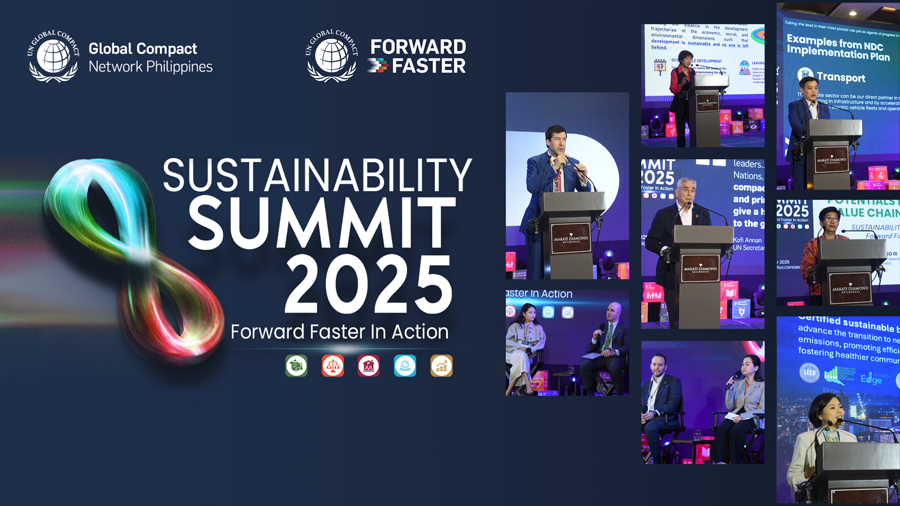Makati, Philippines — The Global Compact Network Philippines (GCNP) held the Sustainability Summit 2025 on 12 November 2025 at Makati Diamond Residences, convening leaders from business, government, development organizations, and civil society. The Summit demonstrated how the Philippines can move Forward Faster toward the Sustainable Development Goals (SDGs) through a unified, multi-sector approach at a time when global progress continues to fall behind.
Anchored on the Forward Faster initiative of the UN Global Compact, the Summit outlined how the private sector can accelerate SDG progress through measurable commitments in five priority areas: Climate Action, Gender Equality, Living Wage, Water Resilience, and Finance & Investment. These accelerators reflect the clearest pathways for business to drive meaningful impact between now and 2030.
The Urgent Imperative
GCNP Chairperson Ma. Victoria Tan opened with a call for urgency, noting that only 18% of global SDG targets are on track and urging companies to move “from declarations of intent to demonstrable action.” She emphasized the country’s growing momentum in sustainability but warned that progress remains slow without stronger multisectoral collaboration.
UN Resident Coordinator Arnaud Peral, represented by Matija Kovač, reinforced that message, citing Philippine innovations in circularity, digital inclusion, gender equality, and renewable energy as proof that the country is becoming a regional driver of SDG action—capable of turning global ambition into local impact.
Ayala Corporation Chairman Jaime Augusto Zobel de Ayala, one of GCNP’s founding members, called for a shift “from voluntary virtue to verified impact.” Reflecting on the UN Global Compact’s 25-year journey, he underscored that embedding sustainability requires difficult trade-offs and leadership alignment, but results in more resilient, future-ready business.
The Blueprint for Collective Action
The plenary then moved toward coordinated national action. Climate Change Commission Secretary Robert E.A. Borje outlined how the Philippines is operationalizing its Nationally Determined Contributions (NDCs) through a whole-of-government and whole-of-society approach, emphasizing that climate finance must be traceable to measurable outcomes.
DEPDev Undersecretary Rosemarie Edillon followed with the Philippine Development Plan 2023–2028, stressing alignment between national priorities and private sector innovation from renewable energy and green infrastructure to circular systems and sustainable agriculture.
The plenary then moved to one of the Summit’s key segments, the GCNP CEO Forum, featuring next-generation leaders from major Philippine conglomerates. Moderated by journalist Howie Severino, the panel brought together Jaime Urquijo of Ayala Corporation, Cecile Ang of San Miguel Corporation’s New NAIA Infrastructure Corp., Jessica Sy of SM Prime Holdings and SM Development Corp., and Rafael Fernandez de Mesa of Aboitiz Land and Aboitiz Economic Estates.
They underscored that sustainability is now embedded in strategy and governance. Urquijo noted, “What is good for the planet can also unlock efficiencies and competitiveness.”
Ang highlighted San Miguel’s approach to nation-building: “Every major project we build, from airports to expressways, must contribute to resilience and leave no one behind.”
Sy highlighted SM’s broad customer-facing impact: “Sustainability is not an afterthought; it is in the architecture, the supply chain, and the experience of every person who enters an SM property.”
Fernandez de Mesa underscored the Aboitiz Group’s transformation: “Technology allows us to reimagine sustainability as the new measure of performance.”
Arthaland Sustainability Head Samantha Pobre reinforced that sustainability is a core driver of competitiveness and investor confidence. She encouraged companies to begin with deliberate, incremental steps, noting that “sustainability is the smartest investment we can make.”
DTI Assistant Secretary Grace Baluyan reiterated that MSMEs (99.5% of Philippine enterprises) must be at the center of the green transition. She outlined efforts to equip MSMEs with clean technologies, access to green finance, and integration into sustainable value chains.

From Commitment to Action
In the afternoon, UN Global Compact Head for Asia and Oceania, Neha Das, emphasized that Forward Faster provides companies with clear, practical guidance for SDG-aligned action. Three parallel sessions followed on climate and water resilience, gender equality and living wages, and SDG-aligned finance and investment, each offering concrete steps companies can adopt to align with Forward Faster priorities.
GCNP Spotlight Sessions from Lloyd’s Register Foundation and IRRI showcased innovations in ocean safety and methane reduction in rice systems. GCNP Board Secretary Melissa Vergel de Dios followed with a testimony on how GCNP programmes supported PLDT’s sustainability journey, ending with ESG Data Specialist Erich Lagura’s presentation of PLDT’s disaster monitoring system—a model for technology-driven community resilience showcased at the Leaders Summit in New York.
The Summit concluded with the Forward Faster Commitment Wall, where participants pledged concrete actions aligned with the five accelerators. GCNP Board Treasurer Dr. Hian Ho Kua closed with a call for collective leadership: “Forward Faster is not a slogan. It is shared responsibility, courage in action, and hope in motion.”



